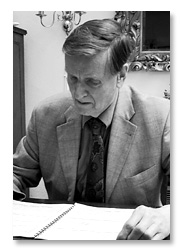
Nicholas Jackson (1934)
Nicholas Jackson was born in London in 1934. His family assumed that he would become an architect, following in the footsteps of his grandfather Sir T.G. Jackson, who had designed many of the famous landmarks in Oxford, such as the Bridge of Sighs, during the late nineteenth Century. Accordingly, he was taken abroad to study architecture, and while a boy at Radley College won a competition with a design for a theatre. Despite having begun the piano at the late age of fourteen, upon leaving school he switched his attention to music and became Organ Scholar at Wadham College, Oxford, where he studied musical theory under Edmund Rubbra. His father was a good amateur violinist who, as well as being an authority on French history, loved French music. This enthusiasm was passed on to his son, and was to be a major influence in his future work as a composer. He also studied the harpsichord with George Malcolm and Gustav Leonhardt, the organ with C.H. Trevor, conducting with Sir Adrian Boult, and musical theory with John Gardner.
It may seem strange that Nicholas Jackson did not begin composing until he was over thirty, but by then he was able to incorporate into his writing the complicated techniques used in the French organ music that he performed, such as the reconstructed improvisations of Tournemire, which often require one hand to play on two keyboards simultaneously. His first published composition, Mass for a Saint’s Day, was recorded by the choir of Winchester Cathedral and continues to be sung all over the English-speaking world.
Jackson used to haunt the Paris organ lofts of Notre Dame, St Clothilde and St Sulpice, sitting beside organists such as Pierre Cochereau, André Marchal, Marcel Dupré and Jean Langlais while they improvised for services. His 1985 Organ Sonata was inspired by memories of watching Dupré improvise shortly before the latter’s death in 1971. This influence is particularly evident in the chorale-like melody accompanied by running sixths with which the work begins, and which reappears triumphantly in the major key during the Finale.
His Variations on ‘Parise to the Lord, the Almighty’ also aim to capture something of an improvisation by Cochereau or Dupré, displaying all the tonal resources of a large instrument. Sometimes, as in Variations 7 and 8, a canon at the sixth between the outer parts does not quite work, but is then successful when played at the octave in the repeated section. The work consists of an Introduction and ten Variations and concludes with a short Fugato and Toccata. It was composed in 1988 and was first performed in the presence of Yehudi Menuhin.
It was at an organ recital at Notre Dame in 1971 that Jackson met the French girl who was later to become his wife. His Four Images were written for her, and were given their first performance by the composer at a recital in Notre Dame in the following year. The Elevation and Toccata which appear on the present recording comprise two of the Images, and are intended to precede and conclude the composer’s Mass for a Saint’s Day. The Toccata is in fact based upon the figuration that accompanies a unison tune in the Gloria of the Mass.
He made his début in 1964 at the Wigmore Hall, performing harpsichord concertos, and went on to hold the position of Organist at S James’s Piccadilly and St Lawrence Jewry-next-guildhall, in London. In 1977 he became Organist and Master of the Choristers at St David’s Cathedral in Wales, where he remained until 1984. During this time he gave organ recitals in London, Paris, Berlin and other European cities, as well as in the USA, making regular tours of Spain as harpsichordist with the London Virtuosi. In 1987 he became Director of the Bach Festival at the Santes Creus monastery in Spain, where he re-formed his own chamber orchestra, the Concertante of London. He gives regular recitals with the trumpeter Maurice Murphy, and has made several solo recordings, including the complete organ works of Richard Arnell. In 1944-5, Jackson was Master of the Draper’s Company, and founded an annual series of concerts for young musicians, which he continues to organize. Sir Nicholas Jackson is an Honorary Fellow of Hertford College, Oxford.






























